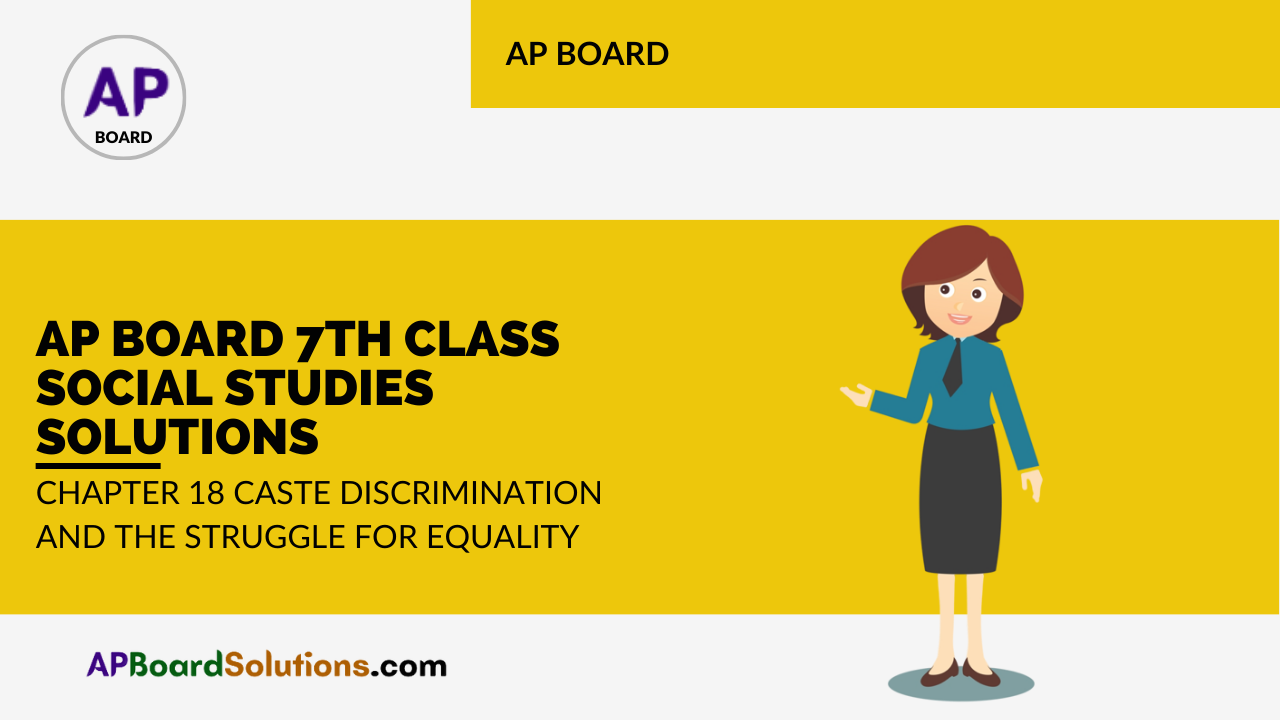SCERT AP Board 7th Class Social Solutions 18th Lesson Caste Discrimination and the Struggle for Equality Textbook Questions and Answers.
AP State Syllabus 7th Class Social Studies Solutions 18th Lesson Caste Discrimination and the Struggle for Equality
7th Class Social Studies 18th Lesson Caste Discrimination and the Struggle for Equality Textbook Questions and Answers
Improve Your Learning
Question 1.
What is the difference between being punished for a mistake and being discriminated against? Was the child Ambedkar being punished or discriminated against?
Answer:
There is a lot of difference between being punished for a mistake and being discriminated against. Punishment is given to those who commit a mistake or a wrong without showing any discrimination. More than that punishment is corporal but discrimination has an effect on one’s psyche, dignity, and character. But the discrimination is shown based on one’s birth and social status. Punishing those who commit wrongs defends the rights of other people. But discrimination denies the people their freedom, equality, respect, and dignity of the victims.
The child Ambedkar did no wrong, so he was not supposed to be punished. But he was discriminated against because of his caste and thus he was denied social equality, self-respect, and dignity.
![]()
Question 2.
Do you think it is possible to make friends across castes – what kind of problems will you have to overcome this?
Answer:
It is possible to make friends across states. I have no problems.
Question 3.
Our Constitution abolished the practice of untouchability and declared it a crime.
Do you think it has been fully abolished in practice?
Answer:
Article No: 17 abolished the practice of untouchability and declared it to be a crime. But in practice, it has not been fully abolished from society.
One of the main reasons for this is that attitudes change very slowly. Even though persons are aware that discrimination is against the law, they continue to treat people unequally on the basis of their caste, religion, disability, economic status, and gender. It is only when people begin to believe that no one is inferior and that every person deserved to be treated with dignity that present attitudes can change.
Question 4.
Why do you think people want to marry within their caste? Will this help to preserve caste inequality?
Answer:
A group of people, who follow some common rules and customs, worship the common deities, follow the same profession or work, and are bonded together said to be one caste Every caste has its own identity its own rules and customs, its own deities. Each case wants to keep its own identity by keeping itself into an undivided element. They don’t want to mix with others. They feel it as contamination of caste if their young ones marry other caste people.
If people go on negating inter-caste marriages the caste system keeps on strengthening itself. As it goes on strengthening all the social evils that remain alive, Thus it will help to preserve caste inequality.
![]()
Question 5.
Savitri Bai Phule was the first headmistress of the country’s first school for girls in Pune. She devoted her life to educating Dalits. She started a night school for agriculturists and laborers. She died while serving plague patients.
Answer:
She was a social reformer along with her husband Jyothi Rao Phule, who played an important role in women’s rights in India during British, rule. She pioneered the campaign for women’s education, staging the first school for girls at Pune in 1848. Savitribai was the first female teacher of the first women’s school in India. In 1852, she opened a school for untouchable girls. Even though she faced many problems, she continued her teaching for the welfare of Dalits.
